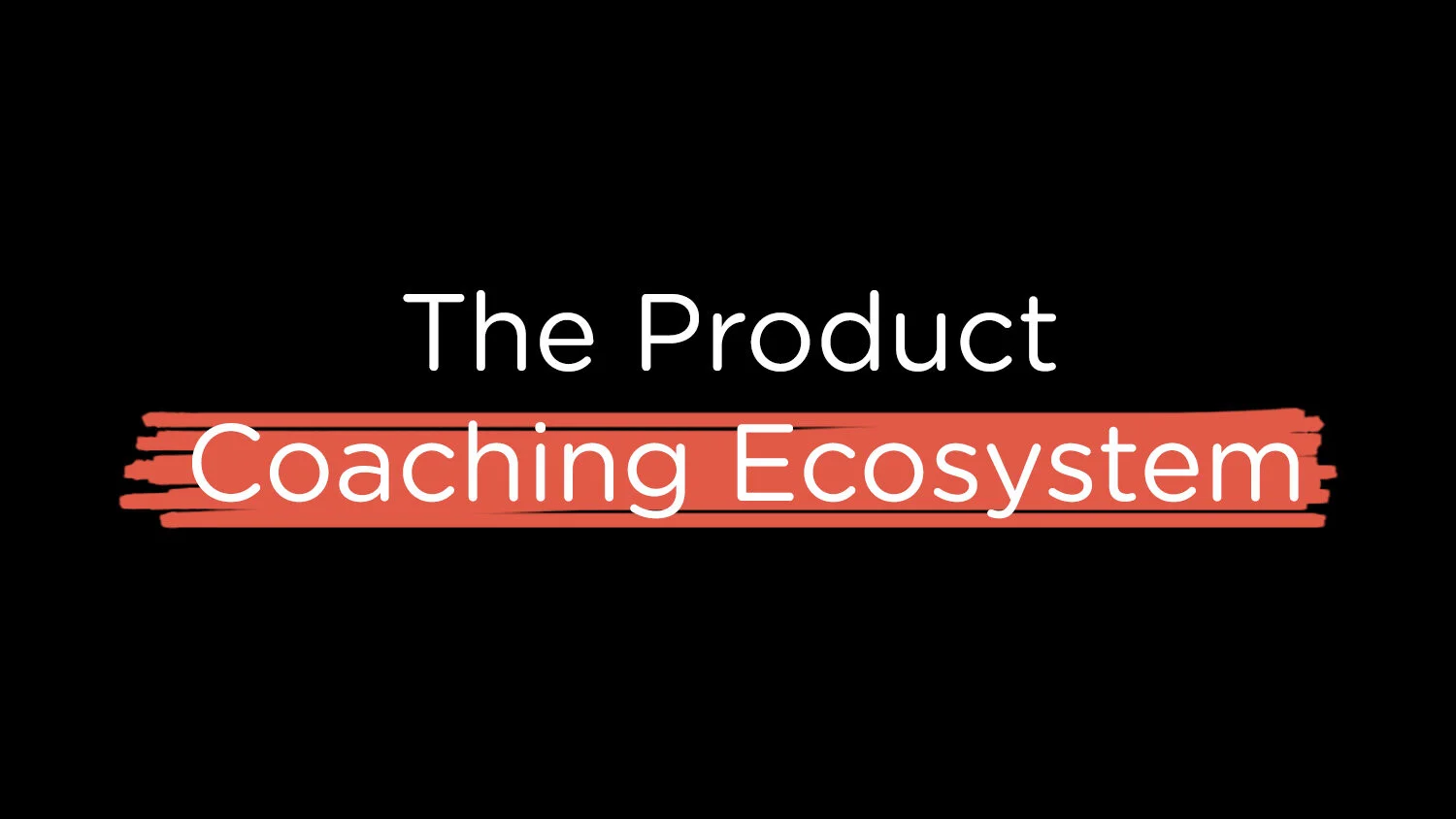I recently listened to a podcast episode with Kenneth Berger, and one of his core ideas truly struck a chord with me: uncovering "the dream behind the complaint. Kenneth's insight is a beautiful framing for product leaders. When a direct report comes to you with a complaint, there's often a deeper, unspoken desire behind it.
Read MoreAs product leaders, we shape the standards for our teams. And I think in too many cases, product leaders are not setting high enough standards. Let me explain. I’ve been seeing a trend on social media (LinkedIn, in most cases) where product managers and even product leaders argue that the concepts and frameworks thought leaders (including myself) share and promote are overly ambitious.
Read MoreIf we had infinite resources, we would be able to say yes all the time. But sadly, that’s not the world we live in. Things are scarce: time, competent humans able to get a job done (often called “developers”), money for software licenses, cloud storage... you name it. Product management is so much about working within these limitations that it’s only natural that saying no is such a vital part of our job.
Read MoreWhen one of your direct reports comes to you with a problem, is your first instinct to step in and help them solve it? If that’s the case, I totally get where you’re coming from. As product people, we naturally fall into the role of problem solvers. But if you’re regularly focused on solving all these problems on a one-off basis as they pop up, I have some tough news: You’re probably not being as effective a leader as you could be.
Read More“You’re the most offline person I know while on holiday.” This was a comment one of my coachees, a product director, heard from their manager. As we dove into the conversation, it became clear that this comment was not intended as a compliment. In fact, it was the manager’s not-so-subtle way of saying, “Maybe you should be a bit more available online during your time off.”
Read MoreAs a coach for product leads, I've noticed an interesting phenomenon: Some of my coachees make much more progress than others. And as a naturally curious person (and someone who’s invested in my coachees’ success), I started trying to get to the bottom of this. Why do some people make progress in leaps and strides while others only improve gradually? I’ve come to the conclusion that while there are several key personality traits that can help someone become a great product manager—emotional intelligence, adaptability, and intellectual horsepower—there's another skill that's often overlooked: cross-disciplinary learning.
Read MoreA CoP will help product people share best practices and ways to solve specific challenges. It will make it easier for product people to understand how your organization works and how to effectively work with others outside the product team. This post talks about how to get started with your product community and it contains tips on how to mature this community over time.
Read MoreMTP Engage Hamburg is a three-day event packed full of workshops, panel discussions, keynotes, and networking, so rather than try to cram everything into a single blog post, I’ll be writing a mini-series of MTP Engage Round-up posts. This first post focuses on the Product Leadership Forum portion of the event.
Read MoreGood employee performance is critical to the success of an organization and the products it builds, and feedback is one of the most important factors in employee performance for good reason. As management professor Christine Porath points out in Harvard Business Review: “High-performing teams share nearly six times more positive feedback than average teams.”
But most of us are guilty of not giving enough feedback to our peers, colleagues, and direct reports. Why is that?
Read MoreOne of the recurring themes on my blog and in my work is about professional development. I can’t help it—I’m a coach! I’ve written before about why it’s so important to focus on your own development as a leader. But what exactly should you be focusing on? I realize that it can be hard to know where to focus your efforts, which is why I wanted to share what I’ve been hearing from others who are in your position. Near the end of last year, I asked my LinkedIn community (which is largely made up of Heads of Product, VPs of Product, and other product leaders) to share what they’d like to learn in 2022. Here’s what they had to say.
Read MoreLeaders often find it difficult to get feedback, especially in a structured and actionable way. That’s why I started to offer 360° Leadership Feedback, where I schedule and conduct interviews with your employees and colleagues and package what I learn into an easily digestible format. I believe this will provide you with a solid basis for your self-progression journey. But what is it really like to participate in 360° Leadership Feedback? I figured you’d like to hear directly from a past participant.
Read MoreWhat usually happens in June happened at the end of September this year. Due to the COVID situation, our MTP Engage Leadership Forum made its first autumn premiere. Arne Kittler and I are the organizers of MTP Engage Hamburg and we had the pleasure of hosting the first Mind the Product in-person event since the pandemic hit.
Here are my key learnings from this half-day event.
Read MoreStorytelling is an essential skill for product managers and the key to evangelizing our products. But it's not one that comes naturally. In my Mind the Product London talk, I offer some tips for becoming a better storyteller.
Read MoreCommitting to working with a coach is a big step. It means you’re investing money (maybe your own, maybe your company’s) and time (definitely your own) in your professional development. This is great, but it’s critically important to be thoughtful about how you approach the experience. Like many things in life, coaching depends so much on the effort you put into it.
Read MoreSo you’ve decided that you’re interested in product coaching? That’s great! But it’s a very broad ecosystem and it’s easy to get overwhelmed by everything that’s out there. So my goal is to help you navigate the different offerings and figure out what’s right for you.
Read MoreIn case you haven’t heard the big news yet, my book, STRONG is now published. In this post, I’ll be sharing some of the concepts from the book. If you find yourself wanting to explore any of these topics in more detail, be sure to check out the book. You can order your copy here.
Let’s talk about developing product managers—and not just any product managers, but strong product managers. We all know that product management is a super hard business to be in and we expect a lot from our product people.
Read MoreBig announcement! My book, STRONG: A Complete Guide to Developing Great Product Managers, is now published. If you already know you want to get a copy (or two), you can do so here.
Want to learn a little bit more about who the book is for and what you can expect to learn from it? Keep reading!
Read MoreLet´s assume you are a Product Manager and you know or have figured out what your next best development topic is (e.g. by using the PMwheel) you then should come up with something I would call a development plan. Something that helps you commit to small actions that get you closer to the competent product management personality you want to become.
The future-self framework takes the form of a document that you need to fill, and it has four parts: As-Is, To-Be, Actions and a Timeframe.
Read MoreThe PMwheel has become a reliable compass for people who want to navigate their product career or develop their direct reports. It’s an approach that I have personally used in my work with clients ever since I developed it.
For managers, The PMwheel is a simple, but powerful way to assess the responsibilities, skills, and knowhow of your product managers. Keep in mind that no two assessments for your different product managers will be the same—some will be stronger in one area, while others will be stronger in others.
Read MoreBack in 2016, I was working with the product organization of a larger tech company. They asked me to help every product manager on the team “understand the role of the product manager better,” and to help the product managers understand what “better” would actually look like.
This was not an easy challenge and, although I had a certain take on what product managers should be responsible for, I lacked a clear framework—an assessment that I could have discussed with the individual product manager in one of our coaching sessions.
Read More


















